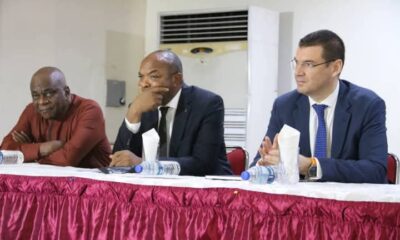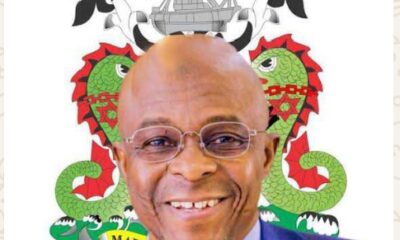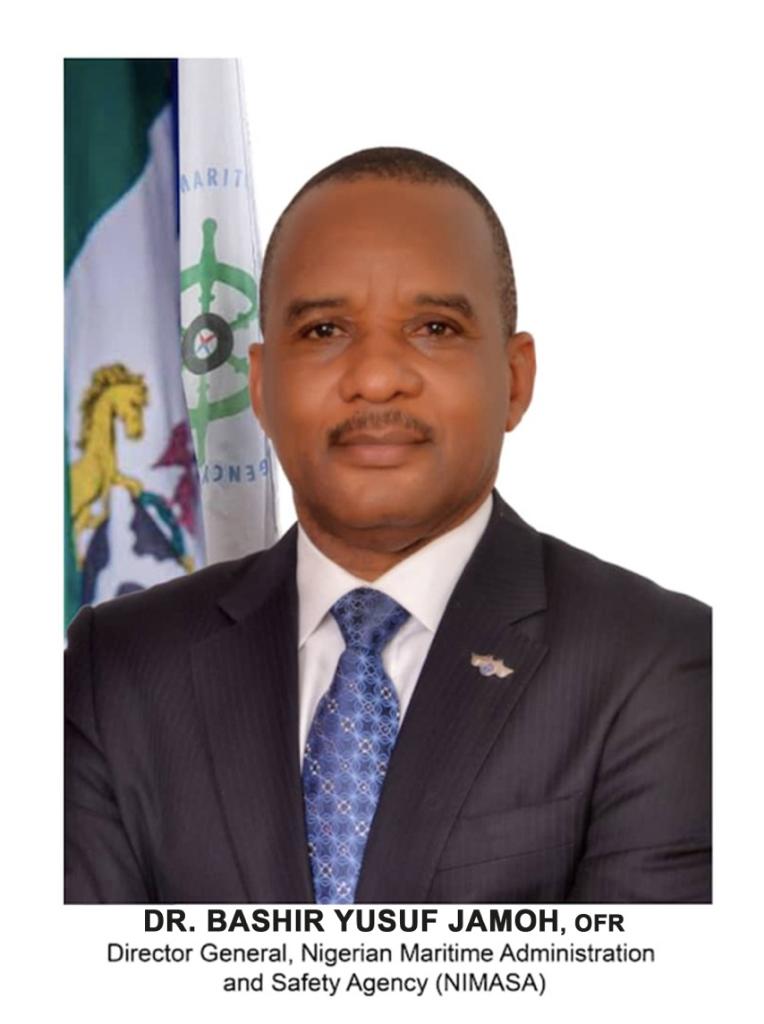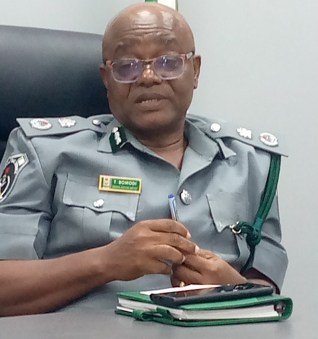Analysis
Cabotage Act : Jamoh takes steps to deepen national growth

It is not a secret that the Coastal and Inland Shipping Trade, otherwise known as the Cabotage Act, passed into law by the National Assembly since 2003 has failed to sail owing to various factors, not excluding deliberate official posturing which some stakeholders have described as sabotage.
Perhaps, it is not an accident of history that the narrative is presently undergoing critical and positive changes under the incumbent Director General of Nigerian Maritime Administration and Safety Agency (NIMASA), Dr. Bashir Jamoh, who have demonstrated his unmistaken resolve for a new order.
His quest for a new order is to propel a working maritime economy through better and proactive initiatives that drives local content while maintaining a global outlook. The drive to regenerate the Cabotage Law as a major catalysts in changing the narratives is the Marine Notice issued by NIMASA last week, giving ship owners, oil and gas and maritime operators in the coastal inland transportation value chain three months ultimatum to register with the applicable Special Register for Cabotage Vessels.
In addition to above directive, ship owners are to obtain the Certificate of Cabotage Registration/License, which industry observers say is a turnaround structural rejig, and about the single most decisive official steps so far taking to date, at getting the Cabotage Law to work for the benefit of all stakeholders in the maritime sector.
Those whose business it is to know admit that although the Cabotage Law has certain inherent default from its legal conception, official oversight has posed the most challenges as those who should drive the implementation appeared to have surrendered for too long to narrow inclinations and personal interests, which has rendered the Cabotage Law ineffectual.
There have also been concerns that government officials before now, especially at the top hierarchy of implementation and decision making at the ministry of transportation and NIMASA, in addition to perceived selfish regulatory bumps by the Nigerian National Petroleum Corporation (NNPC) have weakened the processes through deliberate emphasis of the fault lines.
According to analysts, this has given room to perceived questionable and unwarranted concession to foreign operators, and who therefore cashed in on our officials willingness to trade off important exclusive economic rights to foreign interests. Speaking shortly after NIMASA issued the marine notice, the NIMASA DG said that operators with expired registration certificates are to ensure the renewal of their Cabotage Operational Certificate/License for all Cabotage vessels within three months.
A statement made available to Pinnacle Time by Philip Kyanet, Head Corporate Communications of NIMASA quoted the NIMASA boss as saying:
“At the expiration of the three months, NIMASA will notify relevant government authorities and International Oil Companies (IOCs), to bar vessels without valid Cabotage certificates.”
An uncommon patriot and distinguished transport technocrat, Jamoh said that the notice was part of efforts to ensure strict enforcement of the Coastal and Inland Shipping (Cabotage) Act 2003.
Determined to turn around the national fortune accruable from the nation’s maritime and ports economy, he said that there would also be strict enforcement of the Guidelines on Implementation of the Coastal and Inland Shipping (Cabotage) Act 2003.
Accordingly, he reiterated the salient points in the Cabotage Act, which stipulates that every vessel intended for use in domestic trade, must be duly registered by the Registrar of Ships. “The law provides that every vessel intended for use under the Cabotage Act must be duly registered in the appropriate register and operational certificates renewed annually.
“We are out to ensure strict implementation of NIMASA’s mandate under the law. Ultimately, our intention is to build and continue to enhance the capacity of Nigerians in the shipping industry in line with relevant international regulations,” he said.
Reacting to the development, President, Alumni Association of Maritime Academy of Nigeria Oron (AMANO), Engr. Austin Umezurike thumbed up the reawakening of Cabotage Law as an essential component is reviving dead areas of the economy to respond to fresh impetus aimed at revamping national growth.
He said, “I think that what is happening in the industry now under NIMASA is what should have happened many years before now. Economies don’t grow without strong initiatives, and Cabotage was supposed to be one strong engine for local content participation because no nation leaves its economy entirely in the hands of foreign operators.”
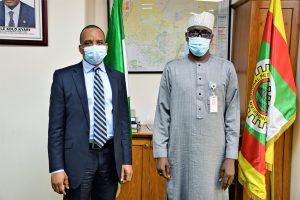
Jamoh and NNPC GMD Kyari
Umezurike urged Jamoh and his team not to waver is completely reviving “all dead knots and bots in the engine of our maritime economy”, even as he identified contractual requirements, competency and certification as some issues NIMASA should also focus on in addressing the ills that has so far afflicted the full enforcement of the Cabotage Act.
He said once the implementation of the Cabotage Vessel Financing Fund (CVFF) comes on stream, it will give Cabotage Law the full impetus to impact more positively on the national economy, and urged local ship owners not to relent in building capacities to meet stringent requirements imposed by the International Oil Companies (IOCs).
“Few days ago I said in a presentation that up to 80 and 90 percent of vessels doing business in Nigerian maritime sector supports the oil and gas industry. Ironically, they are dominated by International Oil Companies which have stringent certification requirements.
“They make sure that vessels operating with them have certain categories of personnel onboard and also ensure that local vessel owners meet the minimum requirements. Presently, one of the requirements is that they should have certificates from certain countries that are internationally recognized. If they do not meet these requirements, they are not given contracts, and it is very painful to see that you cannot participate in the distribution of your resource.
“So I think that NIMASA is on the right track to improve on local participation in the coastal inland trade. It can enforce compliance with the Cabotage requirements in terms of 100 per cent manning, but contractual requirements have actually affected full implementation.” he noted.
Also commenting, President, Nigerian Institute of Shipping, Dr. Capt. Anthony Onoharigho commended the patriotic new spirit with which the new leadership in NIMASA is going about to redirect implementation of policies for the benefit of national growth and all players. He however tasked Jamoh and his team to intervene in the rejection of Nigerian classified vessels from engaging in crude transportation by the IOCs.
He said Cabotage Act will gain much more if NIMASA also is able to stop the unfair practice of preventing local vessels from coastal freight on the ground that such vessels did not carry international classification. He argued that international classification is an expression of standard which should not be twisted to feed the ego of particular nations, and further argued that what is needed is standard vetting in line with prescribed criteria, which must be accepted as international.
“I strongly object to the idea that Nigerian surveyors lack the capacity to vet and classify ships. Why must you impose the judgment of a US or Canadian or UK surveyor over the judgment of a Nigerian surveyor? On what basis, that we didn’t read the books they read or that we are less competent to audit ships? This insult must stop.”
He explained that the classification difference is in nomenclature only, noting that the difference in vessels vetted by International Association of Classification Societies, IACS, and lndigenous Classification Societies, ICS, rests in the expression and that one is foreign and the other local.
Onoharight who doubles as the Liberian Deputy Ship Registrar said above sentiments should however not affect mutual participation of players, whether foreign or local. He said the Nigerian Class Vessels is not by any stretch of the imagination technically inferior in any way to Foreign Class Vessels, and urged the Federal Government and NIMASA to come up with a strategy to unite both for the interest of all.
He lamented that the continued foreign domination and ganged up against vessels audited by local classification society by the IOCs is unwarranted, primitive and provocative. He said “it is misleading to say there is a single international vessel surveyor. Any surveyor that can classify a vessel in Nigeria can do so in Britain, US and anywhere else, using the same criteria.”
He faulted the posture of the IOCs in the rejection of Nigerian Classified Vessels as vexatious and urged the Federal Government to take urgent steps to end this colonial economic posturing. He reason that oil and gas shipping is a matter of national priority, and called on NIMASA to be decisive in getting foreign players including the IOCs to respect Nigerian right to play in the industry, and to take step to ensure that Nigerian Classified Vessels are respected and integrated into international conventions and standards.
“NIMASA that is in charge of regulating this sector has knowledge the non IACS members certify vessels in Nigeria, and they accept certificates issued by them, until the oil companies started refusing to accept vessels classified by ICS.
“If the Nigerian government has accepted the non IACS members to carry out survey and classification of vessels, why would the company majors reject vessels classified by ICS members?
“The IACS members are foreign class society companies, while the ICS or non IACS members, most of us are Nigerians. Nigeria has a duty to compel the IOCs to allow vessels classified by non IACS members to work in their oil field. We are not second class and we are nobody’s economic slave.
He said it is unfair for foreign powers to impose their high cost on Nigerian ship owners to obtain classification, which was the basis for adopting home certification method that has proved more affordable and co-efficient in standard.
“They compel our ship owners to make use of their own classification which is very expensive, and this has caused a lot of ships in Nigeria not to have class to operate. It has kept many people out of work, and many vessels are tied down at different jetties because the oil companies don’t accept non IACS certification.
“It is good to have international conventions and standards, international protocols are aggregated from local member states of any international body. It is arrogance taking too far for the IOCs to continue to dictate to Nigeria, and it is insulting to say individual nations outside US and Europe should not have a say in the affairs of their oil and gas trade.
“NIMASA should compel the oil companies to accept vessels certified by non IACS classification which are approved by the government. Within the oil sector where we have the supply boat of 120tons or 300tons, how do you expect them to take IACS certification when they have paid about $35,000 for the vessel, and they are not even sure of getting jobs when they finish.
“It is making life difficult for the ship owners because most of them want to classify their vessels but cannot pay the funds, and the stringent measure put in place by IACS right now is intended to monopolize the industry.
“They have no right to deprive any vessel from working in Nigeria because it is a national approval. Chevron, Mobil for example doesn’t touch any vessel that is non IACS and this is not good.”
Maritime resource person, Charles Okorefe lauded Jamoh and his management for the recent marine notice issued by NIMASA. He said the new direction will check the impunity hitherto exhibited by foreign interests in the nation’s coastal trade.
His words: “The 3 months ultimatum given by NIMASA to the IOC’s and other vessel owners operating with expired Licenses in Nigerian waters is a very welcome development. It gives credence to the letters of the Cabotage Act by way of enforcement. It has always been an all comers game with the foreign operators carrying on with impunity while still dominating the nations Cabotage trade.
“Registration of all Cabotage vessels with the nation’s Registrar of ships will ensure accountability and accuracy of data in the number of vessels operating in Nigeria’s coastal and inland waters and as such make room for adequate collection of requisite fees and charges to swell the CVFF purse. More money means more empowerment for qualified indigenous ship owners who are meant to benefit from the CVFF.
“It will put a check to the excesses of foreign ship owners operating Cabotage vessels in Nigeria and give further impetus to indigenous players. In a nutshell, it is a very welcome development if only NIMASA can walk the talk, sustain the enforcement policy and refuse to succumb to the expected intimidation from the foreign ship owners and IOCs. Ordinarily, it should take us very far.”

